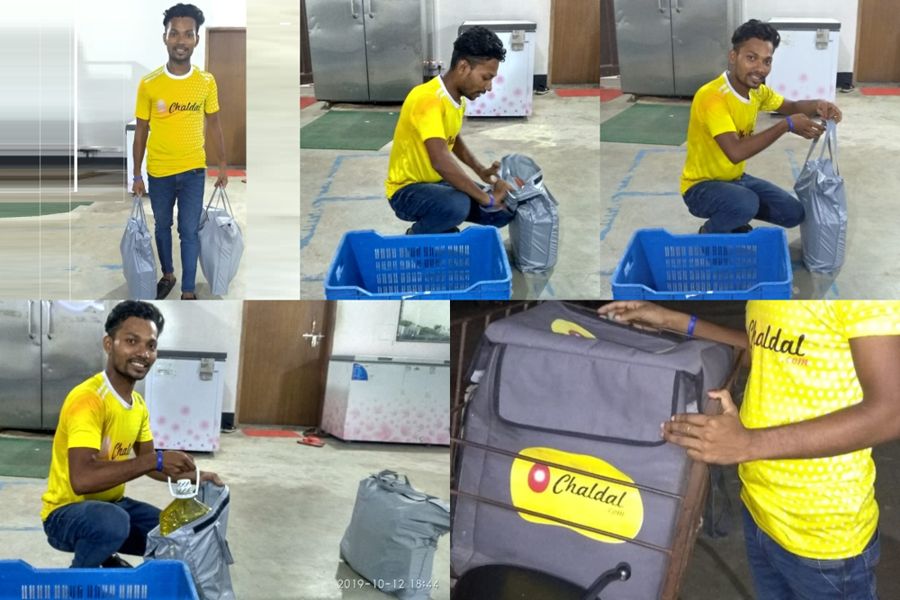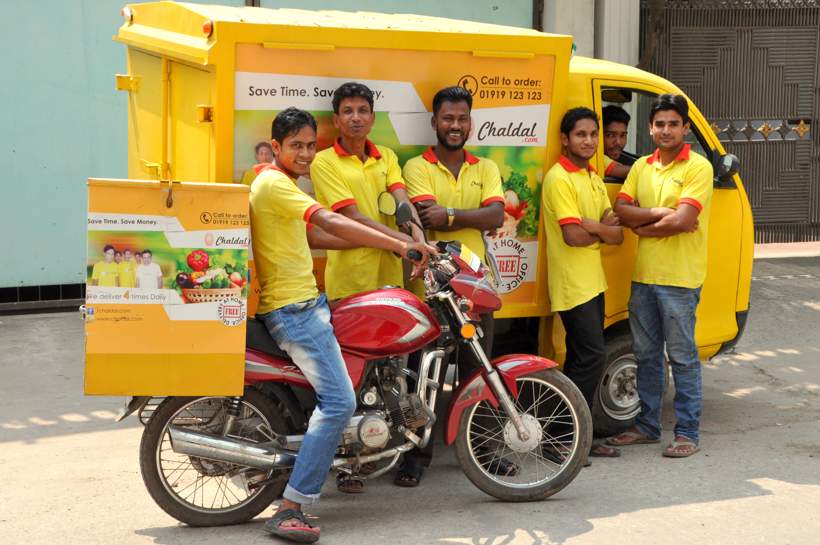
Chaldal, the leading online grocery company in Dhaka, has introduced an environment-friendly initiative a few months ago: its customers have to return the shopping bag that they receive during delivery of groceries. Customers could keep the bag for reuse in exchange for an old one or a small charge of Tk 50 and upon return, this petty change is given back. Chaldal decided to move away from plastic packaging to more expensive sustainable and environmentally friendly packaging such as cloth bags.
Naturally, the change has received a lot of attention and garnered various reactions, both positive and critical, from Chaldal users and the online community in Dhaka. More on that in a moment.
Considering the regular trends in Bangladesh, this is an unusual move. More so in ecommerce where companies pay a lot of attention to packaging as a means to establishing a brand affinity among customers. Chaldal’s decision was considered half-baked and to some extent, not customer friendly by many. Many long-time customers of Chaldal, the company enjoys an excellent retention rate among its customers, questioned the move. Many predicted that the change would cause friction and increase the cost for the company.
Despite the reaction, Chaldal has decided to move forward with the change. The company says that it has its reasons for enacting the change. It also explained that the change would allow the company to fulfill its environmental commitment, reduce packaging costs, a counter-intuitive claim that disputes popular belief that plastic packaging is cheaper than packaging made from sustainable materials, and offer cost benefits to its customers. Today, after months of the experiment, the company says it has reached somewhere.
Everyday trash is one of the biggest contributors to plastic pollution in Bangladesh. Ecommerce and food delivery companies generate an enormous amount of plastic waste. This is not something exclusive to Bangladesh. This is the case in every market where these companies operate. While getting food delivered is convenient, the environmental cost is often overlooked.
Over the past months, Chaldal has slowly been moving away from using plastic bags in its delivery. It gradually transitioned to bags that are durable and made from environmentally friendly materials. The company says it has made the decision after thinking through the long-term consequences of using plastic bags on the environment as well as on packaging costs.
Decisions like asking customers to return a bag for reuse or pay for it are polarizing in nature. Initially, many Chaldal customers did not take the decision positively. The company had to answer questions that people otherwise never asked. But it is an important decision if you consider the environmental cost of plastic use. Globally, corporations are increasingly making decisions based on values and common public goods. Chaldal’s decision is well in sync with a changing world where corporations are increasingly getting involved in social activism due to pressure from employees and consumers.
Everyday trash is one of the biggest contributors to plastic pollution in Bangladesh. Ecommerce and food delivery companies generate an enormous amount of plastic waste. This is not something exclusive to Bangladesh. This is the case in every market where these companies operate. While getting food delivered is convenient, the environmental cost is often overlooked. As these new economy sectors grow, the size and impact of plastics waste continue to increase. Plastic has toxic pollutants that damage the environment and cause land, water, and air pollution. It can take hundreds or even thousands of years for plastic to break down, so the damage to the environment is long-lasting. Only responsible behavior from corporations and consumers could change this situation in the long-run.
“We believe consumers can help fix the problem by making an effort to reduce plastic waste,” says H U Shahed, Director - Operations at Chaldal. He indicates that Chaldal’s commitment to the environment is related to its packaging change. “A great way to reduce waste is to use reusable bags when you shop for groceries,” Chaldal says this is one reason the company introduced the change. “People often leave stores with dozens of plastic bags that just get thrown away. This is one of the reasons we have decided to bring down plastic bag use by 70% at Chaldal,” Mr. Shahed explains.
Mr. Shahed says Chaldal is “committed to delivering the fresh products that will not cause any health hazard to our customers.” The packaging is a big part of this healthy food as well. At the same time, the company has been paying a lot of attention to building a pro-earth operation. “Our operation is paperless except for when the customers want invoice because we cannot help it”. Finally, the company is now reducing the use of polythene. The company says it looks forward to bringing down the use of polythene to 0%.
But these changes are not easy. Many of pro-environment initiatives are not financially viable. Others need significant work to make sense as a business. “The margin on grocery product is low,” says Mr. Shahed. Chaldal has been optimizing its operation to address this low margin challenge. Moving to pro-environment packaging adds a new layer to the challenge. However, over the past months through a series of clever moves, the company has been able to find a financially viable way to execute on sustainable packaging goals as well as add benefits for its customers in the process.
Over the past months, Chaldal has slowly been moving away from using plastic bags in its delivery. It gradually transitioned to bags that are durable and made from environmentally friendly materials. The company says it has made the decision after thinking through the long-term consequences of using plastic bags on the environment as well as on packaging costs.

Chaldal’s decision to reduce the use of plastic bags is a great move. It serves the company’s goal to adopt a pro-environment practice at a time when climate change has become one of the most pressing issues in the world. But moving to sustainable packaging is not easy.
Chaldal understands this reality. Transitioning from plastic bags to eco-friendly ones is expensive, which is why most companies resist such change. Chaldal thought this challenge through before enacting the current change. It analyzed the cost and potential downside of moving to an eco-friendly option.
The company identified early on that transitioning to non-plastic eco-friendly packaging is expensive. To counter the cost, it figured out that if Chaldal can encourage its users to reuse or pay for the bags, it would not only allow it to successfully transition to sustainable packaging, it would, in fact, allow it to save cost in the process that it could then give back to its customers in the form of price competitiveness. The company identified a few strategies to implement the strategy. The first, finding a reusable packaging that would eventually reduce cost.
“We always work hard to give our customers the best deal at the best price but no one carries the cost of our packaging, which means it makes it challenging for us to offer the best price to our customers while the packaging is expensive,” says Mr. Shahed. “In the past, we used to mostly use plastics bags. Plastics are cheap but their environmental cost is not. So we decided to reduce plastic use by 70% and started using bags made of clothes.”
Bags made from clothes could be used multiple times eventually reducing the actual cost of packaging. It encourages customers to adopt the change. Below are a few steps that have helped Chaldal in the process.
When Chaldal decided to transition from plastic packaging to more sustainable, it had to think hard about the cost. Eventually, it found a hack in the reusable cloth bags. “We decided to reduce using polythene by 70% but we had to find a way to do it cost-efficiently. Eventually, the company started using bags made of clothes that could be used multiple times. On the one hand, it has contributed to Chaldal’s environmental goals and on the other hand, the company could save costs by using the same bag multiple times.
The second clever thing Chaldal did is that the company started to encourage its customers to take part in its journey to sustainable packaging. After the delivery, Chaldal started to take back bags and use the same bag for multiple deliveries. The move, as mentioned at the beginning of this piece, caused some users to raise eyebrows. The sentiment eventually changed when Chaldal explained the change to its customers. At the same time, the company introduced an option for customers to buy the bag. “We give the customers two options: either to return the bag to our delivery man and get 50 taka refund or keep the bag and return the bag from a previous order. Returning a bag at any time, Chaldal refunds Tk 50” says Mr. Shahed.
While plastic packaging is cheap, it can seldom be reused. Whereas a bag made from cloth could be reused many times. Which means, Chaldal’s move to cloth bags eventually helps the company save cost on the packaging. “We have figured out early on that if we could ensure reuse of our bags, it would eventually reduce the cost of packaging and help us to save money that we could transfer to our customers in the form of a better price,” says Mr, Shahed.
Chaldal’s decision to reduce the use of plastic bags is a great move. It serves the company’s goal to adopt a pro-environment practice at a time when climate change has become one of the most pressing issues in the world. But moving to sustainable packaging is not easy. Chaldal understands this reality. Transitioning from plastic bags to eco-friendly ones is expensive, which is why most companies resist such change. Chaldal thought this challenge through before enacting the current change.
Sustainable packaging is not a commonplace talk in Dhaka -as yet. There are some 20,000 food deliveries take place through food delivery platforms in Dhaka. In grocery, Chaldal alone delivers above 2000 orders per day. These platforms are not bound to maintain certain packaging guidelines. But these players have the leverage to influence the overall state of sustainable packaging in Bangladesh.
Bangladesh is perhaps one of the countries with the fastest growth in the usage of plastic during the last decade. Between 2005 and 2014, plastic usage in urban areas of the country has increased by 169 per cent. The potential environmental risk of plastic pollution is huge.
This offers an opportunity for companies with a vision to lead a necessary change - creating incentives at the user level and building a meaningful framework within the organization to adopt sustainable packaging. This kind of responsible change should bring long-term benefits to companies. And positive media coverage around any effort to reduce plastic usage is just icing on the cake.
The strategies Chaldal has applied to implement on its sustainable packaging goal could serve as a case study for companies willing to take on the challenge. There will be questions regarding how much this change would be preventing land-fills from overflowing with plastic waste, but it always better to be on the right side of any good fight.
